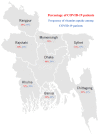Impact of Zinc, Vitamins C and D on Disease Prognosis among Patients with COVID-19 in Bangladesh: A Cross-Sectional Study
- PMID: 36501059
- PMCID: PMC9737649
- DOI: 10.3390/nu14235029
Impact of Zinc, Vitamins C and D on Disease Prognosis among Patients with COVID-19 in Bangladesh: A Cross-Sectional Study
Abstract
Vitamin C, (ascorbic acid), vitamin D (cholecalciferol) and zinc (zinc sulfate monohydrate) supplements are important in immunity against coronavirus disease-2019 (COVID-19). However, a limited number of studies have been conducted on the association of vitamins and supplements with the reduced risks of COVID-19 infection. This study aims to evaluate the association of vitamins and supplements as treatment options to reduce the severity of COVID-19. Data were collected from 962 participants from 13 December 2020 to 4 February 2021. The presence of COVID-19 was confirmed by qRT-PCR. The Chi-square test and multivariate regression analyses were conducted. The ratio of uptake of vitamin C:vitamin D:zinc was 1:1:0.95. Uptake of vitamin C, vitamin D and zinc were significantly associated with the reduced risk of infection and severity of COVID-19 (OR: 0.006 (95% CI: 0.03-0.11) (p = 0.004)) and (OR: 0.03 (95% CI: 0.01-0.22) (p = 0.005)). The tendency of taking supplements was associated with the presence of infection of COVID-19 (p = 0.001), age (p = 0.02), sex (p = 0.05) and residence (p = 0.04). The duration of supplementation and medication was significantly associated with reduced hospitalization (p = 0.0001). Vitamins C, D and zinc were not significantly (p = 0.9) associated with a reduced risk of severity when taken through the diet. Hospitalization (p = 0.000001) and access to health facilities (p = 0.0097) were significantly associated with the survival period of the participants. Participants with better access to health facilities recovered early (OR: 6.21, 95% CI 1.56-24.7). This study will add knowledge in the field of treatment of COVID-19 by using vitamins and zinc supplements.
Keywords: Bangladesh; COVID-19; treatment; vitamin C; vitamin D; zinc.
Conflict of interest statement
The authors declare no conflict of interest.
Figures
References
-
- COVID-19 Map-Johns Hopkins Coronavirus Resource Center. [(accessed on 13 August 2022)]. Available online: https://coronavirus.jhu.edu/map.html/2022.
-
- WHO Coronavirus Disease (COVID-19) Dashboard. [(accessed on 13 August 2022)]. Available online: https://covid19.who.int//2022.
-
- Malik Y.A. Properties of coronavirus and SARS-CoV-2. Malays J Pathol. 2020;42:3–11. - PubMed
-
- Sharif N., Dey S.K. Phylogenetic and whole genome analysis of first seven SARS-CoV-2 isolates in Bangladesh. Future Virol. 2020;15:735–746. doi: 10.2217/fvl-2020-0201. - DOI
MeSH terms
Substances
LinkOut - more resources
Full Text Sources
Medical


